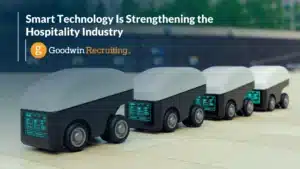Smart Technology Is Strengthening the Hospitality Industry
Goodwin Recruiting | Leadership | November 25, 2024

As you plan for 2025, you’re no doubt looking for new ways to ensure your hospitality guests have the best possible experience. But what exactly does an exceptional guest experience look like? Ideally, it should be a mirror of your value promise to customers!
Restaurants, hotels, and all hospitality industry companies are each unique in their offerings and business models. This means you need custom ideas and solutions that work best for your explicit goals and customers.
And so, if customizable smart technology is on your radar, you’re off to a great start for a successful New Year. Artificial intelligence (AI), the internet of things (IoT), and other advanced technologies are expanding the capabilities and benefits of solutions designed especially for the hospitality industry.
Smart technology greatly increases functionality, efficiency, and the guest experience, and it is becoming increasingly integral to hotel and restaurant operations.
To make the most informed decisions, explore some of the top smart technologies that are driving hospitality industry technology trends.
Text Message Waiting List Technology
Today’s hospitality environment is very competitive, and the last thing a business wants is to watch people turn away when the waitlist is too long. To protect business and revenue, and meet guest expectations, many restaurants have turned to text message waiting list technology (SMS). This efficient smart technology manages customer waitlists or queues and helps prevent guests from choosing a competing location.
Let’s say a guest knows there is a 45-minute wait. Through text messaging, you can notify them when their turn is approaching and when service is ready. This allows your guests to wander around nearby or go shopping, rather than block the entrance of your venue while waiting, or worse, leave altogether.
It’s a customer service standard across many industries
Not surprisingly, early adopters of this technology were primarily in the hospitality and healthcare sectors, where long wait times are common. As cell phones, smartphones, and other mobile devices became universal and SMS technology more advanced, hospitality industry companies saw the potential of using texting to improve the guest experience by managing queues and reservations.
Even though this technology has been around since the early 2010s, it became essential during the COVID-19 pandemic, especially for restaurants, healthcare providers, retailers, and other organizations that had to rapidly adopt contactless and virtual queuing solutions to survive. Today, these solutions are all about advancement and growth in a post-pandemic world.
What makes it smart? The latest versions of these widely adopted tools improve restaurant operations and guest experiences in a lot more ways than keeping people informed of their status in the queue.
Today’s text message waitlist tools enhance efficiency, user experience, and customization with features like dynamic wait times that update in real-time, two-way communication, personalized services, reporting and analytics, multichannel integration, and advance ordering features, just to name a few! For example, a restaurant can text a menu preview while customers wait and allow them to order appetizers in advance.
Here are a few popular providers to explore and learn more about this technology:
Self-Order and Self-Pay Solutions
Point-of-sale (POS) kiosks and related technologies are crucial tools for businesses of all types and sizes, including organizations in many sectors of the hospitality industry. This technology is for hospitality companies that are determined to increase efficiency and profitability.
Restaurant customers are becoming more comfortable in using self-order stations to order and pay for meals. Take McDonald’s, for example. Instead of going to the counter to order, many customers find it easier to use the self-order station, where they can quickly and easily select what they want, pay via the kiosk, and grab their spot in the order queue. More than 130,000 kiosks have already been rolled out at McDonald’s locations worldwide, and the kiosks have boosted sales by 11%.
Tabletop point-of-sale technology is expanding
Some sit-down restaurants are offering tabletop tablets that guests can use to view menus, order food and drinks, and pay their bill – all through the tablet. No server or cashier counter required! For example, Chili’s announced in August 2024 that they have rolled out Ziosk tablets to more than 1,100 locations.
The tablets come with an integrated rewards program, AI-powered post-dining surveys, and other interactive features that provide insights for Chili’s team members to continue refining their hospitality models. Guests can also play games on the Ziosk tablets.
Restaurant Dive recently reported that pay-at-table solutions are “increasingly becoming part of the casual dining experience, boosting table turns by allowing customers to pay and go without having to flag down wait staff.”
What makes them smart? Today’s advanced and fully integrated point-of-sale solutions simplify hospitality operations, enhance the customer experience, record and deliver meaningful data analytics and insights into sales transactions, process payments, track inventory, and much more.
Here are a few highly rated point-of-sale system providers for restaurants to consider:
Digital Check-In for Hotels and Resorts
Digital check-in technology is a fast-growing component of the hospitality industry’s shift into digital transformation, process modernization, and integrated automation. This time- and cost-saving capability streamlines hotel operations by allowing guests to check into their guest rooms, suites, bungalows, or other accommodations without needing to go through the process at the front desk with hotel staff.
It’s part of the broader trend toward contactless services
Contactless service in the hospitality industry spiked during the pandemic and five years later, it still ranks sky-high in both consumer demand and in company efforts to control operational costs while providing greater efficiency and customer satisfaction.
The benefits are many for all parties
Guests receive a notification via email, SMS, or app before their stay, with the option to check in digitally. They can upload their personal ID through a secure portal, and review charges and securely input payment details for pre-authorizations or deposits for hotel rooms.
Hotel and resort guests appreciate the convenience, flexibility, and personalized experience, and hotel industry owners and operators achieve operational efficiencies, cost savings, higher guest satisfaction, and the ability to capture data for personalized marketing based on guest needs and preferences.
What makes it smart? Digital check-in is enabled by several state-of-the-art technologies, ranging from hotel-specific mobile apps or third-party digital platforms to self-service kiosks on hotel properties, cloud-based hotel management systems for real-time guest room availability and key issuance, and IoT devices that provide smart locks and room controls that are integrated with the digital check-in process, including access to guest rooms using a digital key.
Check out some of the best contactless check-in systems for hotels here.
Robot Food Delivery
The global hospitality delivery robot market is anticipated to grow from $14.87 billion in 2024 to $72.88 billion by 2032, driven by higher adoption rates, growing demand for labor-saving technologies, and increasing awareness of the benefits of autonomous and semi-autonomous delivery robots.
Indeed, many hotels, resorts, and restaurants, as well as hospitals, college campuses, and other organizations are finding success in using robots to deliver food and beverages. Delivery robots are an important segment of the overall hospitality robot market in their proven ability to deliver food, drinks, and other items to tables, guest rooms, and even homes, improving efficiency and reducing wait times.
“A transformative solution”
In his recent article in Hospitality Technology, “How Robotics Can Solve the Challenges Facing Food Delivery Apps,” Richtech Robotics President Matt Casella discusses how the restaurant industry is shifting into the adoption of robotics and how this promises to take restaurant operations to a new level of efficiency and innovation.
Regarding food delivery ‘apps,’ Casella said, “Consumers are increasingly frustrated by rising fees and declining service quality, which negatively impacts customer satisfaction and restaurant orders. Amid these challenges, robotics emerged as a transformative solution.”
Casella discusses how robots are being integrated into various aspects of the food and beverage sector, from food preparation to delivery and customer service. On the front lines of food delivery, he said, service robots like Matradee are being employed to deliver orders to tables or directly to customers’ homes, providing a seamless and efficient dining experience.
What makes them smart? Several companies are leading the hospitality delivery robot industry with innovative solutions for food delivery, customer interaction, and operational efficiency in hotels, restaurants, and related environments.
Some of the key players include:
Partner with a leading hospitality talent recruiter
Technology could never replace the dynamic role that human beings play in the hospitality sector.
Even in today’s tech-driven world, hospitality industry owners and operators are doubling down on hiring the most talented people to lead and staff their organizations, focusing heavily on experienced management professionals, technology specialists, data analysts, digital marketing experts, and sustainability professionals for eco-conscious operations and ethical sourcing.
Find the specialized talent you need with a trusted hospitality recruiting firm, including professionals who are familiar with new and emerging smart technologies that can help take your business to the next level.
Goodwin Recruiting is in the Top 3 Hospitality Recruiters, Headhunters, and Executive Search Firms.
Share This Article














































